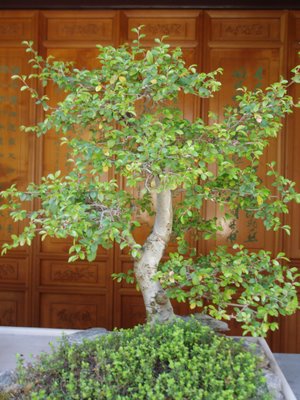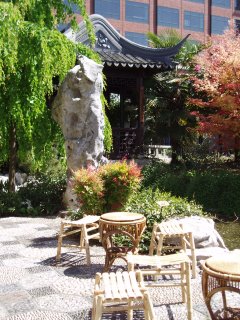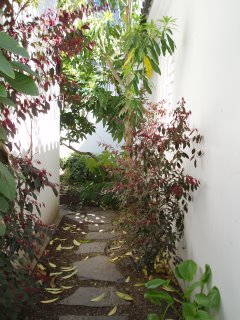Free-spirit
 "It is easy for you to say, you were raised to be a free-spirit," said a friend I've made this past year. He had asked my thoughts on the imminent 'big step' he and his girlfriend of 18 months were about to embark upon: moving in together. The last girlfriend he lived with drove him nuts in short order and he was reluctant to put himself into the same position again. I told him I could understand that all too well, but at the same time, that I considered the practice of using past experience to predict relationship outcomes to be a form of self-fulfilling prophecy. I told him to take the reasonable precautions and then relax and be open to the possibilities in this relationship, which has nothing to do with the old one, unless he makes it so. His comment about it being easy for me to say made me smile. The road to this place has been far from easy, as my closest friends will attest.
"It is easy for you to say, you were raised to be a free-spirit," said a friend I've made this past year. He had asked my thoughts on the imminent 'big step' he and his girlfriend of 18 months were about to embark upon: moving in together. The last girlfriend he lived with drove him nuts in short order and he was reluctant to put himself into the same position again. I told him I could understand that all too well, but at the same time, that I considered the practice of using past experience to predict relationship outcomes to be a form of self-fulfilling prophecy. I told him to take the reasonable precautions and then relax and be open to the possibilities in this relationship, which has nothing to do with the old one, unless he makes it so. His comment about it being easy for me to say made me smile. The road to this place has been far from easy, as my closest friends will attest.For all that I grew up around a bunch of carefree hedonists, there was little stability, consistency, or parenting. In one form or another I raised myself, four sisters, and three parents. My parents were young, self-absorbed, and oblivious to the danger they put their daughters in. I learned first-hand what could happen, and spent my teen years vigilantly trying to protect my siblings from predators. I developed stress-responses and habits, expectations and fears, that stood me in good stead for survival, but handicapped me when I attempted to join the mainstream, to attempt to seem 'normal', to develop and sustain romantic relationships. When I was 18 I returned from a few months in Europe and developed an inexplicable aversion to strangers and unfamiliar places that grew until I was afraid to leave my home. The world of possibilities was terribly large, and my experience of it quite dark in ways. I wanted to try to make sure that whatever I did, whoever I met, created only positive outcomes. I was young and foolish, and terribly controlling. Eventually, I overcame the fear of people, but the fear of the unknown, unknowable, and uncertain became the core of my existence. I did not feel afraid--I was afraid. I did my best to cope, and I grew in and changed in spurts and often lost as much ground as I gained. But I kept working at it, trying to learn what I needed to do to reach for the next rung on the ladder. Striving to become more fully alive and aware, more fully me. All the while keeping in mind that as difficult and slow a process as it seems, even plants can climb ladders.
Just three years ago I was in a miserable relationship that should have ended years earlier but did not, for reasons I cannot recall. We rarely had sex, argued often, had different wants, needs, desires. But we loved each other, and it seemed we thought that was enough. I suppose we preferred being miserable together to being miserable alone. Admittedly, it was a difficult time for me--four people I loved died in as many years and I think I could not face any more loss. When that relationship ended I went into therapy, determined to learn new coping mechanisms and break old patterns, determined to address the issues and complaints my partners had given voice to over the years. And in the therapy- process I chose meditation instead of medication, and did the hard internal work, and read and explored and conversed and contemplated and slowly came to the realization that nearly everything I need I already have within me, and that fear of loss, of death and uncertainty and the 'other', is natural. But rather than deny those fears, rather than sublimate or ridicule them, I realized that it was best to recognize fear for what it was, and allow myself to feel it--let it fill me and flow out of me and let another emotion fill me--love, hope, joy. One day I realized that while I will never be rid of fear, I do not have to be ruled by it.
And I have to remind myself of this daily. I no longer tell myself not to be afraid, or to stop being silly. I remind myself that it is ok to feel afraid. I tell myself that it is ok to feel afraid, but it is not ok to use fear as an excuse not to live every day as fully as I can, to use it as an excuse to avoid embracing the fullness of life. It is not easy. I am flattered that, for all I feel that I am struggling and flailing around, I am somehow managing to meet the challenges of life with enough grace that others think it comes easily to me. But at the same time, I admit that it is coming easier to me--more and more I find myself practicing acceptance and facing each moment with equanimity and spontaneity. They are coming more easily. And perhaps one day I really will be a free-spirit. Who knows? For now I'll savor feeling free-spirited every moment that I can.
Labels: acceptance, chinese garden, conversation, expectations, future, loss, meditation, philosophy, realization, relationships, sexuality, spontaneous, therapy


 Silkenvoice" border="0">
Silkenvoice" border="0">









